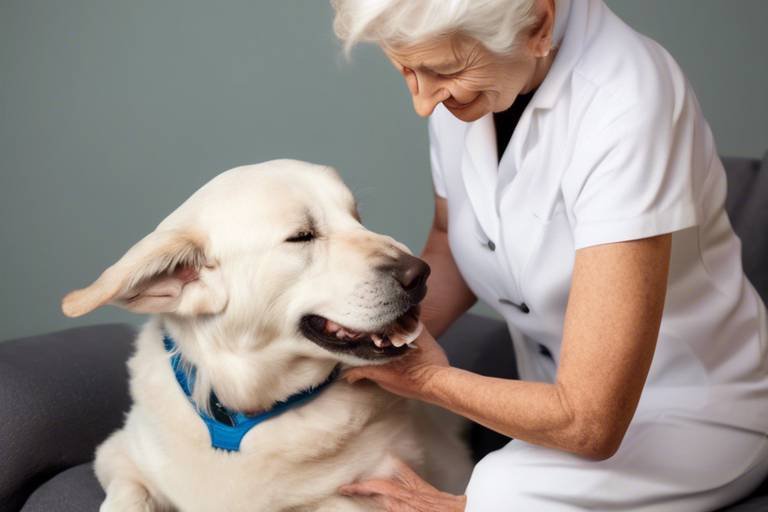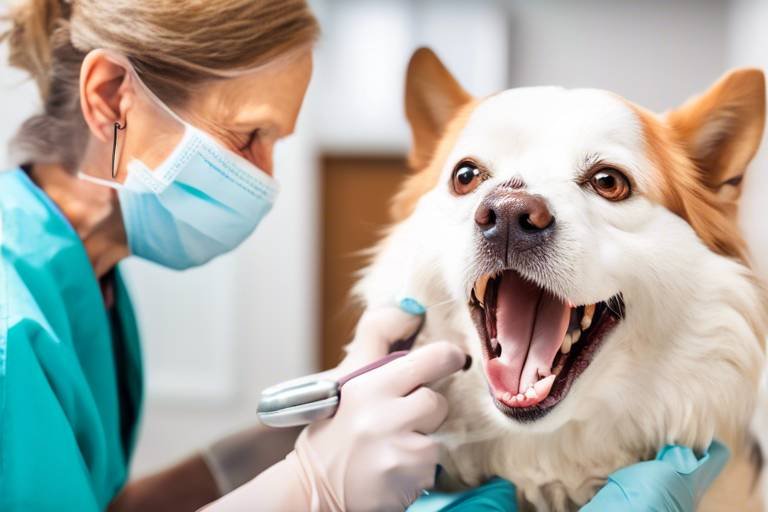Best Practices for Senior Pet Medication Management
Managing medication for our beloved senior pets is not just a task; it's a vital part of ensuring their health and happiness. As our furry friends age, they often face various health challenges that require careful attention and thoughtful care. This article explores effective strategies for managing medication for senior pets, ensuring their health and well-being through proper administration, monitoring, and communication with veterinarians.
Senior pets have unique health requirements that differ significantly from their younger counterparts. Just like older humans, senior pets may experience a decline in their physical abilities, making them more susceptible to illnesses. Understanding these needs is essential for effective medication management and overall care, as it ultimately enhances their quality of life. For instance, their metabolism slows down, which may affect how they process medications. Therefore, pet owners must be vigilant and proactive in recognizing any changes in their behavior or health.
Many senior pets require medications for chronic conditions such as arthritis, diabetes, or heart disease. Familiarity with these common medications helps owners manage their pets' health more effectively. It's important to note that the right medication can make a world of difference in a senior pet's comfort and mobility. For example, anti-inflammatories can alleviate pain from arthritis, allowing our furry companions to enjoy their daily walks again. Understanding the specific needs of your pet can lead to better health outcomes and a happier life.
Medications can be classified into various categories, including anti-inflammatories, pain relievers, and supplements. Knowing the types can aid in understanding their effects on senior pets. Each category serves a specific purpose, and recognizing which type your pet needs is crucial. For instance, anti-inflammatories can help reduce swelling and pain, while supplements might support joint health or improve overall vitality.
Differentiating between prescription and over-the-counter medications is crucial for safe administration. While some medications are easily accessible, others require a veterinarian's approval. This knowledge helps pet owners avoid potential dangers associated with inappropriate use. For example, while it may be tempting to use human medications, many can be harmful or even fatal to pets. Always consult with your veterinarian before administering any medication.
Natural supplements can complement traditional medications, offering additional support for senior pets. Options like omega-3 fatty acids for joint health or probiotics for digestive support can be beneficial. Understanding these options can help owners choose the best approach for their furry companions. It's essential to discuss any supplement plans with your vet to ensure they are safe and appropriate for your pet's specific health needs.
Administering medication to senior pets can be challenging, especially if they are not used to taking pills or liquids. Exploring various techniques can improve compliance and ensure pets receive their necessary treatments without stress. For example, hiding pills in a favorite treat or using a pill pocket can make the process smoother. Additionally, some pets may respond better to liquid medications, which can be easier to administer. The key is to find a method that works best for both you and your pet.
Regular monitoring of medication effects is vital for adjusting dosages and ensuring the safety of senior pets. Observing changes in behavior or health can inform necessary adjustments. For instance, if a pet seems lethargic or is not eating well after starting a new medication, it's essential to contact a veterinarian promptly. Keeping a journal of your pet's reactions can also help track any changes and provide valuable information to your vet.
Recognizing signs of adverse reactions to medications is essential for prompt intervention. Symptoms like vomiting, diarrhea, or unusual behavior can indicate that a medication isn't agreeing with your pet. Being aware of these signs can help owners protect their pets from serious complications. Always err on the side of caution—if something seems off, don’t hesitate to reach out to your veterinarian for guidance.
Effective communication with veterinarians is key to successful medication management. Discussing concerns and seeking advice can lead to better health outcomes for senior pets. Don’t be afraid to ask questions about your pet's medications, side effects, or alternative treatments. Your vet is there to help, and clear communication can make a significant difference in your pet's care.
Establishing a medication schedule can help owners manage their senior pets’ treatments effectively. Consistency is crucial for ensuring that medications are administered on time and as prescribed. Consider using a calendar or planner to keep track of doses, or even set reminders on your phone. This proactive approach can help prevent missed doses and keep your pet on the path to recovery.
Utilizing tools such as pill organizers or mobile apps can simplify tracking medications. These tools help owners stay organized and ensure their pets receive the correct doses. Some apps even allow you to set reminders and track your pet's health progress, making it easier to stay on top of their medication needs.
Flexibility in adjusting medication schedules is important, especially if a pet's health changes. Regular consultations with a veterinarian can guide necessary adjustments to treatment plans. If your pet is experiencing side effects or if their condition changes, don’t hesitate to revisit the medication plan. It’s all about finding the right balance for your furry friend.
Ensuring that all family members are educated about the medication management process is essential for consistent care. This knowledge fosters teamwork in providing the best support for senior pets. When everyone is on the same page, it reduces the risk of missed doses and ensures that your pet receives the best possible care.
Dividing responsibilities among family members can ease the burden of medication management. Collaboration ensures that senior pets receive their medications on time and as prescribed. Assigning specific tasks, such as who administers the medication or who tracks the schedule, can make the process smoother and more manageable.
Establishing a support system among family and friends can enhance medication management. Having additional help can provide reassurance and assistance during challenging times. Whether it’s a neighbor checking in or a friend helping with the medication schedule, a strong support system can make a world of difference.
Q: How can I make giving my pet medication easier?
A: Hiding the medication in a treat or using a pill pocket can help. You can also try liquid medications if your pet is more accepting of those.
Q: What should I do if my pet refuses to take their medication?
A: If your pet refuses medication, consult your veterinarian for alternative options or techniques that may be more effective.
Q: How often should I check in with my veterinarian about my senior pet's medications?
A: Regular check-ins, especially after starting a new medication or if you notice any changes in behavior, are essential. Your vet can provide guidance on how often to schedule these visits.

Understanding Senior Pet Needs
As our beloved furry companions age, their needs evolve significantly. It's much like how we, as humans, require different care as we grow older. Senior pets, typically defined as those over seven years old, often face a myriad of health challenges that demand our attention. For instance, they may suffer from conditions such as arthritis, dental disease, or even cognitive dysfunction. Understanding these unique needs is not just important; it’s crucial for their overall well-being.
One of the most significant aspects of caring for senior pets is recognizing that they may not express discomfort or pain in the same way younger animals do. They might not be as playful or active, and their appetite may fluctuate. This can lead to pet owners mistakenly believing their seniors are simply slowing down due to age. However, it’s essential to pay close attention to subtle changes in behavior, as these can be key indicators of underlying health issues.
Moreover, senior pets often require more frequent veterinary check-ups. Regular visits allow for early detection of potential problems, which can lead to more effective treatment options. During these visits, your vet can assess your pet's weight, dental health, and overall condition, tailoring a health plan that includes appropriate nutrition, exercise, and medication. Regular communication with your veterinarian about any changes you observe at home is vital. This teamwork can significantly enhance your senior pet's quality of life.
Additionally, it's essential to adapt your home environment to cater to your senior pet's needs. Just like we might need a little extra help getting around as we age, our pets do too. Consider implementing the following changes:
- Non-slip mats: These can help prevent slips and falls on slippery floors.
- Accessible bedding: Ensure their sleeping area is easy for them to reach.
- Food and water stations: Place these in easily accessible locations to encourage hydration and nutrition.
In summary, understanding the unique needs of senior pets is a fundamental step in ensuring they live their golden years comfortably and happily. By being proactive and attentive, you can help your furry friends navigate this challenging stage of life with grace and dignity.

Common Medications for Senior Pets
As our beloved furry friends age, they often face a range of health challenges that require careful management, including the use of medications. Understanding the common medications prescribed for senior pets is crucial for any pet owner who wants to ensure their companion lives a happy and healthy life. Many senior pets deal with chronic conditions such as arthritis, diabetes, and heart disease, which can significantly impact their quality of life. By being familiar with these medications, you can become a more effective advocate for your pet's health.
First, let’s dive into the various types of medications that senior pets might need. These can be broadly categorized into:
- Anti-inflammatories: These medications help reduce inflammation and relieve pain, making them crucial for pets suffering from arthritis or other joint issues.
- Pain relievers: These are essential for managing chronic pain and can significantly enhance your pet's comfort and mobility.
- Supplements: Often used to support overall health, these can include omega fatty acids and glucosamine, which are known to promote joint health.
It’s important to note that medications for senior pets can either be prescription or over-the-counter. Prescription medications are specifically formulated for certain conditions and require a veterinarian's approval. This is vital because some over-the-counter medications can be dangerous if not used correctly. For instance, while human pain relievers like ibuprofen may be effective for us, they can be toxic to pets. Therefore, it’s essential to consult your veterinarian before administering any medication.
In addition to traditional medications, many pet owners are turning to natural supplements as a complementary approach. These can provide additional support for senior pets, helping to ease symptoms and improve overall well-being. Supplements like fish oil can promote a healthy coat and skin, while probiotics can aid in digestion. However, it’s crucial to discuss these options with your vet to ensure they are safe and effective for your pet’s specific needs.
Ultimately, managing medications for senior pets requires a proactive approach. By understanding the common types of medications and their purposes, you can better navigate the complexities of your pet's healthcare needs. Regular communication with your veterinarian, along with careful observation of your pet's behavior and health, will help ensure that your furry friend receives the best possible care.
Here are some common questions that pet owners often have regarding medications for senior pets:
- How do I know if my pet needs medication? - If you notice changes in your pet's behavior, mobility, or appetite, it's essential to consult your veterinarian for an evaluation.
- Can I give my pet human medications? - No, many human medications can be toxic to pets. Always consult your veterinarian before giving any medication.
- What should I do if I miss a dose? - If you forget to give a dose, administer it as soon as you remember, unless it's close to the next scheduled dose. In that case, skip the missed dose and continue with the regular schedule.
Types of Medications
When it comes to caring for our beloved senior pets, understanding the they may need is crucial. Just like humans, our furry friends can suffer from various health issues as they age, which often necessitates medication to maintain their quality of life. These medications can be broadly categorized into several types, each serving a specific purpose in managing health conditions.
One of the most common categories are anti-inflammatories. These medications are designed to reduce inflammation and alleviate pain, particularly in pets suffering from arthritis or joint issues. Nonsteroidal anti-inflammatory drugs (NSAIDs) are frequently prescribed to help manage these conditions, providing relief and improving mobility. However, it’s important to monitor senior pets closely when they are on NSAIDs, as they can sometimes lead to gastrointestinal issues.
Another vital category includes pain relievers. Chronic pain can be a significant issue for senior pets, and effective pain management is essential to ensure their comfort. Medications such as opioids or gabapentin may be prescribed for more severe pain, while others may be used for milder discomfort. Always consult with your veterinarian to find the most appropriate pain management strategy for your pet.
Additionally, many senior pets benefit from supplements. These can range from glucosamine and chondroitin for joint health to omega-3 fatty acids for skin and coat condition. Supplements can play a supportive role alongside traditional medications, helping to enhance your pet's overall health and well-being. It’s essential to choose high-quality supplements and discuss them with your veterinarian before adding them to your pet’s regimen.
To give you a clearer picture, here’s a quick overview of the common types of medications and their purposes:
| Type of Medication | Purpose |
|---|---|
| Anti-inflammatories | Reduce inflammation and alleviate pain |
| Pain relievers | Manage chronic pain and discomfort |
| Supplements | Support overall health and specific conditions |
Understanding these types of medications not only helps you make informed decisions about your pet's health care but also fosters a better relationship with your veterinarian. By being knowledgeable about the medications your senior pet may need, you can actively participate in their health management, ensuring they receive the best possible care as they age.
Prescription vs. Over-the-Counter
When it comes to managing your senior pet's health, understanding the difference between prescription and over-the-counter (OTC) medications is crucial. Prescription medications are specifically formulated for certain health conditions and require a veterinarian's approval before they can be dispensed. This means that they have been thoroughly evaluated for safety and efficacy, ensuring that your furry friend receives the best possible care tailored to their unique needs.
On the other hand, over-the-counter medications can be purchased without a prescription and are typically used for common ailments. While they may seem convenient, it’s important to remember that not all OTC medications are safe for senior pets. Their bodies often react differently than younger animals, and what works for a healthy dog or cat might not be suitable for a senior pet dealing with chronic conditions.
Here’s a quick comparison to help you understand the distinctions:
| Aspect | Prescription Medications | Over-the-Counter Medications |
|---|---|---|
| Availability | Requires a veterinarian's prescription | Available without a prescription |
| Formulation | Tailored for specific health issues | General-purpose medications |
| Monitoring | Regular vet check-ups recommended | Self-monitoring; less oversight |
| Side Effects | Carefully studied and monitored | May not be as well-researched for pets |
It's essential to consult with your veterinarian before administering any medication, whether it's prescription or OTC. They can provide insights into the most appropriate treatment options based on your pet's specific health status. For instance, while you might think about giving your senior dog a pain reliever from the pharmacy, it’s vital to ensure that it won’t interact negatively with any other medications they’re taking.
In summary, the key takeaway is to always prioritize your pet’s safety and well-being. If you're ever in doubt, reaching out to your veterinarian can help clarify which type of medication is best suited for your senior pet's health needs.
Natural Supplements
When it comes to caring for our beloved senior pets, can play a crucial role in enhancing their overall health and well-being. These supplements are often derived from plants, herbs, and other natural sources, providing a gentle yet effective way to support various bodily functions. For instance, many pet owners have turned to glucosamine and chondroitin to help manage joint health in aging dogs and cats, promoting mobility and reducing discomfort associated with arthritis.
But the world of natural supplements is vast, and it’s essential to understand which options might be suitable for your furry friend. Some popular natural supplements include:
- Omega-3 Fatty Acids: These are known for their anti-inflammatory properties and can help support heart health, skin health, and cognitive function.
- Probiotics: Beneficial for digestive health, probiotics can help maintain a healthy gut flora, especially important for pets with sensitive stomachs or those on antibiotics.
- Turmeric: With its powerful anti-inflammatory and antioxidant properties, turmeric can support overall health and may help alleviate pain and inflammation.
Integrating these supplements into your pet's routine can be as simple as mixing them into their food or administering them in treat form. However, it's vital to consult with your veterinarian before starting any new supplement regimen. They can provide guidance on appropriate dosages and ensure that the supplements won’t interact with any medications your pet may already be taking. This is particularly important for senior pets, who may have multiple health issues and require a tailored approach to their care.
Furthermore, keep in mind that while natural supplements can offer fantastic benefits, they should not replace traditional veterinary treatments. Instead, think of them as complementary options that can enhance your pet's health journey. Just like we take vitamins to support our health, our pets can benefit from these natural aids, helping them to live their golden years with vitality and joy.
In summary, natural supplements can be a valuable addition to the health regimen of senior pets. By choosing the right supplements and working closely with your veterinarian, you can help ensure that your furry companion enjoys a happier, healthier life.
Q: Are natural supplements safe for senior pets?
A: Yes, many natural supplements are safe for senior pets, but it’s crucial to consult your veterinarian to ensure they are appropriate for your pet's specific health needs.
Q: How do I know which supplements my pet needs?
A: The best way to determine which supplements your pet may need is through a thorough discussion with your veterinarian, who can assess your pet's health and recommend suitable options.
Q: Can natural supplements replace prescribed medications?
A: No, natural supplements should not replace prescribed medications. They can be used in conjunction with medications but always under veterinary guidance.
Q: How long does it take to see results from natural supplements?
A: The time it takes to see results can vary depending on the supplement and the individual pet. Some may notice improvements within a few weeks, while others may take longer. Consistency is key!
Administration Techniques
Administering medication to senior pets can often feel like trying to catch a slippery fish. With their sometimes stubborn personalities and the challenges that come with age, it’s essential to use effective techniques that make the process smoother for both you and your furry friend. One of the most important aspects of medication administration is to ensure that it is done in a way that minimizes stress for your pet. After all, a calm pet is more likely to cooperate!
One effective technique is to use food as a disguise. Many pets will happily take their medication if it’s hidden in a small amount of their favorite treat. You can try using a soft pill pocket, cheese, or even a piece of wet food to hide the pill. Just be sure to monitor how much food you’re giving them, as you don’t want to alter their diet too drastically. If your pet is particularly clever and manages to spit out the pill, you might need to try a different approach.
Another method is to use liquid medications. These can be easier to administer, especially if your pet is resistant to swallowing pills. A syringe can help you deliver the medication directly into their mouth, but be sure to do it gently to avoid causing stress. If your pet struggles with the syringe, try to let them lick the medication off your finger first to get them accustomed to the flavor.
For pets that require long-term medication, creating a routine can be beneficial. Administer the medication at the same time every day, perhaps during a regular feeding time or after a walk. This consistency not only helps you remember but also conditions your pet to expect medication as part of their daily routine. Just like humans, pets thrive on routine!
Moreover, consider using positive reinforcement after administering medication. Reward your pet with praise, petting, or a small treat. This creates a positive association with the process, making it easier for you both in the long run. Think of it as turning medication time into a mini-celebration!
Lastly, if your pet is particularly difficult when it comes to taking medication, don’t hesitate to consult your veterinarian for alternative options. They might be able to suggest different formulations or even compound medications that can be easier to administer. Remember, you’re not alone in this journey, and your vet is there to help!
- What should I do if my pet refuses to take their medication? If your pet refuses to take their medication, try hiding it in food or using a different administration technique, such as a liquid form. If problems persist, consult your veterinarian for alternatives.
- Can I crush my pet's pills? Some medications can be crushed, but others cannot. Always check with your veterinarian before altering the form of any medication.
- How can I tell if my pet is having a reaction to their medication? Watch for signs like vomiting, diarrhea, lethargy, or changes in behavior. If you notice any of these symptoms, contact your veterinarian immediately.
- Is it okay to give my pet medication with food? Generally, yes! Many medications can be given with food, but always check with your veterinarian to ensure it’s safe for your specific medication.

Monitoring Medication Effects
When it comes to our beloved senior pets, monitoring their medication effects is not just a good practice—it's a necessity! As our furry friends age, their bodies can react differently to medications, which means what worked before might not be as effective now. So, how do we stay on top of this crucial aspect of their health? It all starts with observation. Keep a close eye on your pet's behavior, appetite, and energy levels. Changes in these areas could indicate that their medication is either working well or causing adverse effects.
One of the best ways to monitor your pet's response to medication is by maintaining a journal. This journal can track daily observations, including any side effects or improvements. For example, if you notice that your dog seems more lethargic than usual after starting a new medication, jot that down. This information will be invaluable during your next veterinary visit, allowing the vet to make informed decisions about continuing or adjusting the treatment.
Additionally, it's essential to recognize the signs of adverse reactions. Some common reactions may include:
- Vomiting or diarrhea
- Increased thirst or urination
- Changes in appetite or weight
- Behavioral changes, such as increased aggression or withdrawal
By being vigilant and proactive, you can help your pet avoid serious complications. If you notice any of these signs, don't hesitate to contact your veterinarian. They can guide you on what steps to take next, whether it's adjusting the dosage or switching medications altogether.
Moreover, regular veterinary check-ups are crucial for monitoring your pet's health and medication effects. During these visits, your vet may perform blood tests or other diagnostics to assess how well the medications are working. This is especially important for senior pets, as they may have underlying conditions that require careful management. Keeping an open line of communication with your veterinarian will ensure that your pet receives the best possible care tailored to their specific needs.
In summary, monitoring your senior pet's medication effects is a vital part of their healthcare routine. By observing their behavior, keeping a detailed journal, recognizing adverse reactions, and maintaining regular vet visits, you can significantly improve their quality of life. Remember, you are your pet's best advocate, and your attentiveness can make all the difference in their health journey.
Q: How often should I monitor my senior pet's medication effects?
A: It's best to monitor your pet daily, especially after starting a new medication or adjusting dosages. Regular observations can help catch any issues early.
Q: What should I do if I notice adverse reactions?
A: Contact your veterinarian immediately. They can provide guidance on whether to continue the medication or make adjustments.
Q: Are there specific signs I should look for when monitoring my pet?
A: Yes! Pay attention to changes in behavior, appetite, weight, and any physical symptoms like vomiting or increased thirst.
Q: How can I effectively communicate my observations to my vet?
A: Keeping a journal of your pet's behavior and any changes can help you provide detailed information during your vet visits, ensuring they have all the necessary data to make informed decisions.
Signs of Adverse Reactions
When it comes to our beloved senior pets, their health and well-being should always be our top priority. As they age, their bodies may react differently to medications, which can lead to unexpected and sometimes serious adverse reactions. Recognizing these signs early can make all the difference in ensuring your furry friend remains comfortable and healthy. So, what should you be on the lookout for? Let's dive into some common signs that could indicate your pet is having a negative reaction to their medication.
First and foremost, keep an eye on changes in behavior. If your pet suddenly becomes lethargic, irritable, or shows a lack of interest in activities they once enjoyed, it might be a red flag. Just like humans, pets can experience mood swings, and these changes can often signal that something isn’t right. Additionally, loss of appetite is another critical indicator. If your senior pet refuses to eat or drink, it could be a direct response to their medication or an underlying issue that needs addressing.
Another set of symptoms to monitor includes gastrointestinal issues. These can manifest as vomiting, diarrhea, or excessive drooling. If your pet starts exhibiting any of these symptoms, it’s essential to consult with your veterinarian promptly. They might need to adjust the dosage or consider a different medication altogether. Moreover, unusual physical symptoms such as swelling, hives, or difficulty breathing should never be ignored. These can be signs of an allergic reaction, which can escalate quickly and require immediate veterinary attention.
It's also vital to keep track of any changes in mobility. If your pet seems to be in pain, struggles to get up, or shows signs of stiffness, it may be a side effect of their medication, especially with pain relievers or anti-inflammatories. Lastly, increased thirst or urination can indicate that a medication is affecting your pet's kidneys or bladder function. Monitoring these signs can help you catch any adverse reactions early, allowing for quicker intervention.
In summary, being proactive about your senior pet's health is crucial. Regularly observing their behavior and physical state can help you identify any adverse reactions to medications. If you notice any of the symptoms mentioned above, don’t hesitate to reach out to your veterinarian. Remember, your pet relies on you to be their advocate, so staying informed and vigilant is key!
- What should I do if I suspect my pet is having an adverse reaction to medication?
If you suspect an adverse reaction, contact your veterinarian immediately. They can provide guidance on the next steps and may need to adjust the medication or dosage. - How can I tell if my pet is experiencing side effects?
Watch for changes in behavior, appetite, mobility, and any physical symptoms like vomiting or swelling. Keeping a journal of your pet's behavior can help track any changes. - Are there medications that are safer for senior pets?
While every pet is different, some medications may be formulated specifically for senior animals. Always consult your veterinarian for recommendations tailored to your pet’s health needs. - Can natural supplements help with medication side effects?
Yes, some natural supplements can support your pet’s health and may help mitigate side effects. However, always discuss these options with your veterinarian before introducing them.
Communicating with Veterinarians
When it comes to managing your senior pet's medication, effective communication with your veterinarian is absolutely vital. Think of your vet as your pet's health partner; they have the expertise to guide you through the complexities of your furry friend's health needs. It's important to remember that you are not just a pet owner; you are an advocate for your pet's well-being. So, how can you foster this crucial communication?
First and foremost, make sure to prepare for your veterinary visits. Bring a list of all medications your pet is currently taking, including dosages and frequency. This can help avoid any potential interactions and allows your vet to make informed decisions regarding your pet's treatment plan. Additionally, jot down any changes in your pet's behavior or health that you’ve noticed. Are they more lethargic than usual? Have they developed a new cough? These observations can provide valuable insights for your veterinarian.
During your appointment, don't hesitate to ask questions. What are the side effects of this medication? How long should my pet be on this treatment? Are there any alternatives we should consider? These questions not only show your engagement but also help you understand the treatment process better. Remember, there are no silly questions when it comes to your pet's health!
Moreover, if your pet is experiencing adverse reactions or if you have concerns about their medication, reach out to your veterinarian immediately. Quick intervention can make a world of difference. If your vet prescribes a new medication, ask for a follow-up appointment or a phone consultation to discuss how your pet is responding to the treatment.
In addition to in-person visits, consider utilizing technology to enhance communication. Many veterinary clinics offer telehealth services, allowing you to consult with your veterinarian via video calls or messaging apps. This can be especially helpful for quick questions or if your pet is feeling unwell but you want to avoid the stress of a clinic visit.
Lastly, keep an open line of communication even after your appointments. If you notice any changes in your pet's condition after starting a new medication, let your vet know. They may need to adjust dosages or explore alternative treatments. Remember, you are a team working together for your pet's health.
- How often should I communicate with my veterinarian about my senior pet's medication? It's best to maintain regular communication, especially after starting new medications or if you notice changes in your pet's health.
- What should I do if I miss a dose of my pet's medication? Contact your veterinarian for guidance on how to proceed. Never double up on doses without consulting them first.
- Can I use online resources to learn more about my pet's medications? Yes, but always verify the information with your veterinarian to ensure it's applicable to your pet's specific condition.

Creating a Medication Schedule
Establishing a medication schedule for your senior pet is not just a good idea—it's essential for their health and well-being. Imagine trying to keep track of multiple medications for a loved one without a plan; it can get overwhelming, right? The same applies to our furry friends. A consistent schedule ensures that medications are administered on time, helping to maintain the effectiveness of treatments and reducing the risk of missed doses.
To create an effective medication schedule, first, gather all the necessary information about your pet's medications. This includes the name of the medication, the prescribed dosage, and the frequency of administration. You may want to create a simple table to keep everything organized:
| Medication Name | Dosage | Frequency | Time of Day |
|---|---|---|---|
| Arthritis Pain Reliever | 1 tablet | Twice a day | 8 AM, 8 PM |
| Diabetes Medication | 1/2 tablet | Once a day | 7 AM |
Once you have this information, you can start to build a routine. Consistency is crucial when it comes to administering medication. Pets thrive on routine, and having a set schedule will help them anticipate their treatments, making the process smoother for both you and your pet. Consider pairing medication times with daily activities, such as feeding or walks, to create a seamless routine.
However, life can be unpredictable, and sometimes adjustments are necessary. It's important to remain flexible and adapt the schedule as needed, especially if your pet's health changes. Regular consultations with your veterinarian can provide guidance on how to adjust dosages or timings based on your pet’s current condition. Remember, your vet is your best ally in this journey.
Lastly, consider utilizing tools to help you stay organized. Pill organizers can be a lifesaver, allowing you to pre-fill doses for the week. Alternatively, mobile apps designed for pet medication tracking can send you reminders and keep all your pet's health information in one place. This way, you can focus more on enjoying your time with your senior pet rather than worrying about whether you’ve given their medication.
By creating a thoughtful medication schedule, you not only enhance your pet's quality of life but also strengthen the bond you share. After all, nothing beats the peace of mind that comes from knowing you’re doing everything possible to keep your furry companion happy and healthy.
- How do I know if my pet needs medication? Consult your veterinarian if you notice any changes in behavior, appetite, or energy levels.
- What if my pet refuses to take their medication? Try disguising it in food or consult your vet for alternative forms of the medication.
- How can I remember to give my pet their medication? Use a medication tracker app or set alarms on your phone to remind you.
- Can I give my pet over-the-counter medications? Always consult your veterinarian before giving any medications to ensure they're safe for your pet.
Tools for Tracking Medications
This article explores effective strategies for managing medication for senior pets, ensuring their health and well-being through proper administration, monitoring, and communication with veterinarians.
Senior pets have unique health requirements that differ from younger animals. Understanding these needs is essential for effective medication management and overall care to enhance their quality of life.
Many senior pets require medications for chronic conditions such as arthritis, diabetes, or heart disease. Familiarity with these common medications helps owners manage their pets' health more effectively.
Medications can be classified into various categories, including anti-inflammatories, pain relievers, and supplements. Knowing the types can aid in understanding their effects on senior pets.
Differentiating between prescription and over-the-counter medications is crucial for safe administration. This knowledge helps pet owners avoid potential dangers associated with inappropriate use.
Natural supplements can complement traditional medications, offering additional support for senior pets. Understanding these options can help owners choose the best approach for their furry companions.
Administering medication to senior pets can be challenging. Exploring various techniques can improve compliance and ensure pets receive their necessary treatments without stress.
Regular monitoring of medication effects is vital for adjusting dosages and ensuring the safety of senior pets. Observing changes in behavior or health can inform necessary adjustments.
Recognizing signs of adverse reactions to medications is essential for prompt intervention. Being aware of these signs can help owners protect their pets from serious complications.
Effective communication with veterinarians is key to successful medication management. Discussing concerns and seeking advice can lead to better health outcomes for senior pets.
Establishing a medication schedule can help owners manage their senior pets’ treatments effectively. Consistency is crucial for ensuring that medications are administered on time and as prescribed.
Keeping track of medications for senior pets can feel like a daunting task, but thankfully, there are numerous tools available that can simplify the process. One of the most popular options is a pill organizer, which can help you sort out daily doses and ensure that your pet doesn’t miss a single medication. These organizers come in various sizes, allowing you to choose one that fits your pet’s medication needs.
In addition to physical tools, there are also mobile apps designed specifically for pet medication management. These apps can send reminders when it’s time to give your pet their medication, track dosages, and even store important veterinary information. For example, some apps allow you to upload photos of prescriptions and dosages, making it easier to share with your vet during appointments.
Here’s a quick overview of some tools you might consider:
| Tool | Description | Benefits |
|---|---|---|
| Pill Organizer | A container that holds daily doses of medication | Prevents missed doses and confusion |
| Mobile Apps | Smartphone applications for tracking medications | Reminders, dosage tracking, and vet communication |
| Medication Logs | A simple notebook or digital document | Helps track when medications are given |
By utilizing these tools, you can significantly reduce the stress associated with managing your senior pet’s medications. Remember, consistency is key, and with the right tools at your disposal, you can ensure that your furry friend gets the best care possible!
Ensuring that all family members are educated about the medication management process is essential for consistent care. This knowledge fosters teamwork in providing the best support for senior pets.
Dividing responsibilities among family members can ease the burden of medication management. Collaboration ensures that senior pets receive their medications on time and as prescribed.
Establishing a support system among family and friends can enhance medication management. Having additional help can provide reassurance and assistance during challenging times.
- How can I tell if my pet is having a reaction to their medication?
Look for signs like vomiting, lethargy, or unusual behavior. If you notice anything concerning, contact your veterinarian immediately. - What should I do if I miss a dose?
If you miss a dose, give it as soon as you remember unless it's close to the time for the next dose. In that case, skip the missed dose and resume the regular schedule. - Are there any natural supplements I can give my senior pet?
Yes, many natural supplements can support senior pets, such as omega-3 fatty acids for joint health. Always consult your veterinarian before adding any supplements.
Adjusting Schedules as Needed
When it comes to managing the health of our beloved senior pets, flexibility is key. As our furry friends age, their health can change rapidly, requiring us to adjust their medication schedules accordingly. It’s not just about sticking to a routine; it’s about being responsive to their needs. For instance, if you notice your pet is experiencing side effects or if their condition improves or worsens, it might be time to revisit that medication schedule.
Regular consultations with your veterinarian are essential in this process. They can provide guidance on how to modify dosages or even suggest alternative medications that might be more effective as your pet’s health evolves. It’s like tuning a musical instrument; sometimes a little tweak can make all the difference in how well the 'music' of your pet’s health plays out.
To help you stay on top of these adjustments, consider creating a dynamic medication schedule that can be easily modified. You might use a simple table or a digital app that allows you to track changes and note any observations. Here’s a quick example of how you might structure such a table:
| Date | Medication | Dosage | Notes |
|---|---|---|---|
| 2023-10-01 | Arthritis Relief | 1 tablet | Stable condition |
| 2023-10-15 | Arthritis Relief | 1.5 tablets | Increased stiffness noted |
Additionally, keeping a close eye on your pet’s behavior can provide valuable insights. Changes in appetite, energy levels, or even their mood can signal that a medication adjustment is necessary. Imagine your pet as a little barometer of health; they can tell you when something is off, and it’s our job to listen. By being proactive and attentive, you can ensure that your senior pet receives the best possible care, adapting their medication plan to fit their unique journey.
- How often should I check in with my veterinarian about my senior pet's medication? It's best to have regular check-ups, at least every six months, or sooner if you notice any changes in your pet's health.
- What signs should I look for to know if my pet's medication needs adjusting? Watch for changes in appetite, energy levels, and any unusual behaviors. If you see something that concerns you, consult your vet.
- Can I combine different medications for my senior pet? Always consult your veterinarian before combining medications, as some can interact negatively.

Educating Family Members
When it comes to managing medication for senior pets, it's not just a one-person job. Involving the whole family can make a world of difference in ensuring that your furry friend gets the care they need. After all, teamwork makes the dream work! By educating family members about the medication management process, you create a supportive environment that helps everyone stay on the same page. Imagine trying to navigate a maze without a map; that's what it feels like for your pet if only one person knows the ins and outs of their medication schedule.
One of the first steps in this educational journey is to sit down with your family and discuss the specific needs of your senior pet. This includes understanding the types of medications involved, the reasons they are necessary, and how they should be administered. It's essential that everyone knows the following:
- Medication Types: Different medications serve various purposes, such as pain relief, anti-inflammation, or managing chronic conditions.
- Dosage Information: Knowing the exact dosage and timing can prevent any mishaps that could harm your pet.
- Administration Techniques: Some pets may be picky or resistant to taking their meds, so learning effective techniques can be a game-changer.
To make sure everyone is involved, consider creating a simple chart that outlines each family member's responsibilities regarding medication management. This could include who administers the medication, who tracks dosages, and who monitors the pet for any side effects. A visual representation can clarify roles and ensure that no one is left feeling overwhelmed.
Furthermore, establishing a routine can make medication management feel less daunting. For example, if everyone knows that the morning routine includes giving the dog their pill right after breakfast, it becomes a seamless part of the day. But remember, flexibility is key! Sometimes, unexpected changes in your pet's health may require adjustments to the schedule, and having a family that is well-informed can help navigate these changes smoothly.
Lastly, consider creating a support system among family members. This could mean having a buddy system where one person checks in with another to ensure that medications are being administered correctly. It's like having a safety net; if one person forgets or is unavailable, another can step in to help. This collaborative approach not only eases the burden but also fosters a sense of community and shared responsibility in caring for your beloved senior pet.
Q: How can I ensure my family members remember to give medications on time?
A: Setting reminders on phones or creating a shared calendar can be very effective. You can also use pill organizers to make it visually clear when medications need to be given.
Q: What if my pet refuses to take their medication?
A: If your pet is resistant, try disguising the medication in their favorite treat or consult your veterinarian for alternative forms of the medication, such as liquids or flavored options.
Q: How can I track my pet's medication schedule?
A: Utilizing mobile apps specifically designed for pet care or simply keeping a notebook can help you track medications, dosages, and any side effects your pet may experience.
Sharing Responsibilities
When it comes to managing medication for senior pets, sharing responsibilities among family members can make a world of difference. Imagine trying to juggle multiple tasks alone; it can be overwhelming, right? By dividing the duties, you not only lighten your load but also enhance the care your furry friend receives. Think of it as a team sport—everyone has a role to play, and together, you can achieve the best outcomes for your beloved pet.
First and foremost, it's essential to have a family meeting to discuss the medication management process. This way, everyone understands the medications involved, the schedules, and the specific needs of the pet. You can create a simple chart listing each family member's responsibilities. For instance, one person might handle the morning doses, while another takes care of the evening ones. This division ensures that no medication is missed and that your pet receives consistent care.
| Family Member | Responsibility |
|---|---|
| Mom | Administer morning medications |
| Dad | Administer evening medications |
| Child 1 | Monitor pet's behavior |
| Child 2 | Keep track of supplies |
Moreover, it's crucial to ensure that everyone knows how to properly administer the medications. This includes understanding the correct dosages, the timing, and any specific techniques required, such as hiding pills in treats or using liquid medications. By teaching each family member these skills, you create a support network that can step in when someone is unavailable. It's like having a backup quarterback ready to take the lead when needed!
Finally, don't forget to establish open lines of communication. Regular check-ins can help everyone stay on the same page and address any concerns that arise. If someone notices a change in the pet's behavior or health, it's vital to discuss it as a team. This collaborative approach not only improves the management of medications but also strengthens the bond within the family as you all work together for the well-being of your senior pet.
- What should I do if I miss a dose? If you miss a dose, administer it as soon as you remember. However, if it's close to the next scheduled dose, skip the missed one and continue with the regular schedule. Never give two doses at once without consulting your vet.
- How can I make medication time less stressful for my pet? Try using treats or a favorite food to hide the medication. You can also create a calm environment during administration, using soothing voices and gentle handling.
- What signs should I look for that indicate my pet is having an adverse reaction to medication? Watch for unusual behaviors, such as excessive drooling, vomiting, lethargy, or changes in appetite. If you notice any of these signs, contact your veterinarian immediately.
Creating a Support System
When it comes to managing medications for our senior pets, having a robust support system can make all the difference. Think of it as assembling a team of cheerleaders who are there to help you navigate the sometimes overwhelming world of pet care. Just as a sports team rallies together to achieve a common goal, your family and friends can unite to ensure your furry companion gets the love and treatment they need. This collaboration not only eases the burden on you as a pet owner but also enhances the overall well-being of your pet.
First and foremost, it's important to communicate openly with your family members about the specific needs of your senior pet. Share information about their medications, dosages, and the schedule for administration. This way, everyone is on the same page, and no one feels left out of the loop. You might even consider creating a simple medication chart that outlines what needs to be given and when, so everyone can easily refer to it. Here’s a quick example of what that chart might look like:
| Medication | Dosage | Time | Administered By |
|---|---|---|---|
| Arthritis Relief | 1 tablet | Morning | John |
| Diabetes Medication | 2 units | Evening | Sarah |
Additionally, sharing responsibilities can significantly lighten your load. For instance, one family member can take charge of administering morning medications while another handles the evening doses. This division of labor not only ensures that your pet receives their medications on time but also fosters a sense of teamwork and accountability among family members. It’s like having a well-oiled machine where each part plays a crucial role in the overall function.
Moreover, don't hesitate to reach out to friends and neighbors for support. They can help with walks, vet visits, or even just providing companionship for your pet when you’re busy. Establishing a network of trusted individuals can provide peace of mind, knowing that your pet is cared for even when you can’t be there. Having extra hands on deck can also be a source of emotional support for you as a pet owner, especially during challenging times.
In conclusion, creating a support system for managing your senior pet's medications is not just about sharing tasks; it’s about building a community that cares for your furry friend. When everyone is involved, it not only lightens your load but also enriches the lives of your pet and those who care for them. After all, teamwork makes the dream work, especially when it comes to the health and happiness of our beloved companions.
- What should I do if I miss a dose of my pet's medication? It’s important to administer the missed dose as soon as you remember, unless it’s close to the time for the next dose. In that case, skip the missed dose and continue with the regular schedule. Never give a double dose without consulting your veterinarian.
- How can I tell if my pet is having an adverse reaction to medication? Watch for signs such as vomiting, diarrhea, lethargy, or changes in behavior. If you notice any concerning symptoms, contact your veterinarian immediately.
- Are there natural supplements that can help my senior pet? Yes, there are several natural supplements available, such as omega-3 fatty acids for joint health or probiotics for digestive support. Always consult your veterinarian before introducing new supplements.
Frequently Asked Questions
- What are the common medications for senior pets?
Senior pets often need medications for chronic conditions like arthritis, diabetes, and heart disease. Common types include anti-inflammatories, pain relievers, and supplements that help manage these issues effectively.
- How can I ensure my senior pet takes their medication?
Administering medication can be tricky, but there are several techniques you can try. Hiding pills in their favorite food, using pill pockets, or even crushing the medication (if safe) can help. Patience and positive reinforcement go a long way!
- What should I monitor after giving my pet medication?
It's crucial to keep an eye on your pet's behavior and health after administering medication. Look for any changes such as lethargy, loss of appetite, or unusual behavior, as these could indicate adverse reactions that need immediate attention.
- When should I contact my veterinarian about my pet's medication?
You should reach out to your veterinarian if you notice any concerning side effects, if your pet refuses to take their medication, or if their health seems to be declining. Open communication is key to ensuring your pet's well-being.
- How can I create a medication schedule for my senior pet?
Start by listing all medications, dosages, and administration times. You can use a simple calendar, a pill organizer, or a mobile app to keep track. Consistency is vital, so try to administer meds at the same time each day.
- Are there natural supplements I can give my senior pet?
Yes! Many natural supplements can complement traditional medications. Options like omega-3 fatty acids, glucosamine, and probiotics can support joint health and overall wellness. Always consult your vet before adding new supplements.
- How can I involve my family in my pet's medication management?
Educating family members about your pet's medication routine is essential. Share responsibilities like scheduling doses, monitoring effects, and providing support. This teamwork not only eases your burden but also ensures consistent care.
- What tools can help me track my pet's medications?
There are several tools available to help you stay organized. Pill organizers can simplify daily doses, while mobile apps can send reminders and track medication schedules. Choose what works best for you and your pet's routine!



















